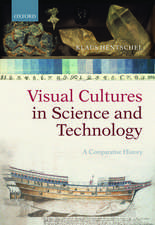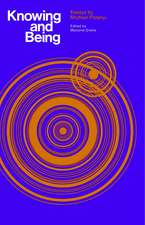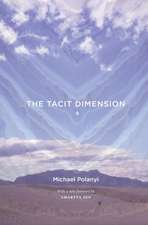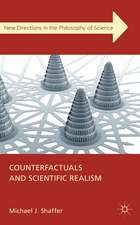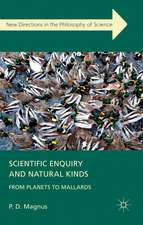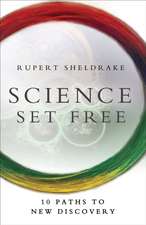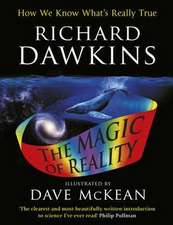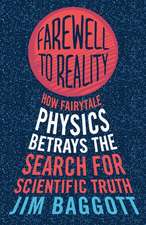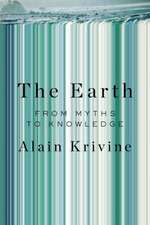Personal Knowledge: Towards a Post-Critical Philosophy
Autor Michael Polanyi Cuvânt înainte de Mary Jo Nyeen Limba Engleză Paperback – 22 iun 2015
The publication of Personal Knowledge in 1958 shook the science world, as Michael Polanyi took aim at the long-standing ideals of rigid empiricism and rule-bound logic. Today, Personal Knowledge remains one of the most significant philosophy of science books of the twentieth century, bringing the crucial concepts of “tacit knowledge” and “personal knowledge” to the forefront of inquiry.
In this remarkable treatise, Polanyi attests that our personal experiences and ways of sharing knowledge have a profound effect on scientific discovery. He argues against the idea of the wholly dispassionate researcher, pointing out that even in the strictest of sciences, knowing is still an art, and that personal commitment and passion are logically necessary parts of research. In our technological age where fact is split from value and science from humanity, Polanyi’s work continues to advocate for the innate curiosity and scientific leaps of faith that drive our most dazzling ingenuity.
For this expanded edition, Polyani scholar Mary Jo Nye set the philosopher-scientist’s work into contemporary context, offering fresh insights and providing a helpful guide to critical terms in the work. Used in fields as diverse as religious studies, chemistry, economics, and anthropology, Polanyi’s view of knowledge creation is just as relevant to intellectual endeavors today as when it first made waves more than fifty years ago.
In this remarkable treatise, Polanyi attests that our personal experiences and ways of sharing knowledge have a profound effect on scientific discovery. He argues against the idea of the wholly dispassionate researcher, pointing out that even in the strictest of sciences, knowing is still an art, and that personal commitment and passion are logically necessary parts of research. In our technological age where fact is split from value and science from humanity, Polanyi’s work continues to advocate for the innate curiosity and scientific leaps of faith that drive our most dazzling ingenuity.
For this expanded edition, Polyani scholar Mary Jo Nye set the philosopher-scientist’s work into contemporary context, offering fresh insights and providing a helpful guide to critical terms in the work. Used in fields as diverse as religious studies, chemistry, economics, and anthropology, Polanyi’s view of knowledge creation is just as relevant to intellectual endeavors today as when it first made waves more than fifty years ago.
| Toate formatele și edițiile | Preț | Express |
|---|---|---|
| Paperback (2) | 212.88 lei 38-45 zile | |
| Martino Fine Books – 3 dec 2013 | 212.88 lei 38-45 zile | |
| University of Chicago Press – 22 iun 2015 | 217.62 lei 6-8 săpt. |
Preț: 217.62 lei
Nou
Puncte Express: 326
Preț estimativ în valută:
41.64€ • 43.48$ • 34.46£
41.64€ • 43.48$ • 34.46£
Carte tipărită la comandă
Livrare economică 04-18 aprilie
Preluare comenzi: 021 569.72.76
Specificații
ISBN-13: 9780226232621
ISBN-10: 022623262X
Pagini: 464
Dimensiuni: 152 x 229 x 30 mm
Greutate: 0.59 kg
Ediția:Mărită
Editura: University of Chicago Press
Colecția University of Chicago Press
ISBN-10: 022623262X
Pagini: 464
Dimensiuni: 152 x 229 x 30 mm
Greutate: 0.59 kg
Ediția:Mărită
Editura: University of Chicago Press
Colecția University of Chicago Press
Notă biografică
Michael Polanyi (1891–1976) was a Hungarian-British chemist and philosopher, a fellow of the Royal Society, and a fellow of Merton College, Oxford. His many books include Science, Faith, and Society; Knowing and Being; and Meaning, all published by the University of Chicago Press.
Cuprins
Foreword
Preface
Acknowledgements
PART ONE: THE ART OF KNOWING
Chapter 1 OBJECTIVITY
1. The Lesson of the Copernican Revolution
2. The Growth of Mechanism
3. Relativity
4. Objectivity and Modern Physics
Chapter 2 PROBABILITY
5. Programme
6. Unambiguous Statements
7. Probability Statements
8. Probability of Propositions
9. The Nature of Assertions
10. Maxims
11. Grading of Confidence
Chapter 3 ORDER
12. Chance and Order
13. Randomness and Significant Pattern
14. The Law of Chemical Proportions
15. Crystallography
Chapter 4 SKILLS
16. The Practice of Skills
17. Destructive Analysis
18. Tradition
19. Connoisseurship
20. Two Kinds of Awareness
21. Wholes and Meanings
22. Tools and Frameworks
23. Commitment
24. Unspecifiability
25. Summary
PART TWO: THE TACIT COMPONENT
Chapter 5 ARTICULATION
26. Introduction
27. Inarticulate Intelligence
28. Operational Principles of Language
29. The Powers of Articulate Thought
30. Thought and Speech. I. Text and Meaning
31. Forms of Tacit Assent
32. Thought and Speech. II. Conceptual Decisions
33. The Educated Mind
34. The Re-interpretation of Language
35. Understanding Logical Operations
36. Introduction to Problem-Solving
37. Mathematical Heuristics
Chapter 6 INTELLECTUAL PASSIONS
38. Sign-Posting
39. Scientific Value
40. Heuristic Passion
41. Elegance and Beauty
42. Scientific Controversy
43. The Premisses of Science
44. Passions, Private and Public
45. Science and Technology
46. Mathematics
47. The Affirmation of Mathematics
48. Axiomatization of Mathematics
49. The Abstract Arts
50. Dwelling In and Breaking Out
Chapter 7 CONVIVIALITY
51. Introduction
52. Communication
53. Transmission of Social Lore
54. Pure Conviviality
55. The Organization of Society
56. Two Kinds of Culture
57. Administration of Individual Culture
58. Administration of Civic Culture
59. Naked Power
60. Power Politics
61. The Magic of Marxism
62. Spurious Forms of Moral Inversion
63. The Temptation of the Intellectuals
64. Marxist-Leninist Epistemology
65. Matters of Fact
66. Post-Marxian Liberalism
PART THREE: THE JUSTIFICATION OF PERSONAL KNOWLEDGE
Chapter 8 THE LOGIC OF AFFIRMATION
67. Introduction
68. The Confident Use of Language
69. The Questioning of Descriptive Terms
70. Precision
71. The Personal Mode of Meaning
72. Assertions of Fact
73. Towards an Epistemology of Personal Knowledge
74. Inference
75. Automation in General
76. Neurology and Psychology
77. On Being Critical
78. The Fiduciary Programme
Chapter 9 THE CRITIQUE OF DOUBT
79. The Doctrine of Doubt
80. Equivalence of Belief and Doubt
81. Reasonable and Unreasonable Doubt
82. Scepticism within the Natural Sciences
83. Is Doubt a Heuristic Principle?
84. Agnostic Doubt in Courts of Law
85. Religious Doubt
86. Implicit Beliefs
87. Three Aspects of Stability
88. The Stability of Scientific Beliefs
89. Universal Doubt
Chapter 10 COMMITMENT
90. Fundamental Beliefs
91. The Subjective, the Personal and the Universal
92. The Coherence of Commitment
93. Evasion of Commitment
94. The Structure of Commitment: I
95. The Structure of Commitment: II
96. Indeterminacy and Self-Reliance
97. Existential Aspects of Commitment
98. Varieties of Commitment
99. Acceptance of Calling
PART FOUR: KNOWING AND BEING
Chapter 11 THE LOGIC OF ACHIEVEMENT
100. Introduction
101. Rules of Rightness
102. Causes and Reasons
103. Logic and Psychology
104. Originality in Animals
105. Explanations of Equipotentiality
106. Logical Levels
Chapter 12 KNOWING LIFE
107. Introduction
108. Trueness to Type
109. Morphogenesis
110. Living Machinery
111. Action and Perception
112. Learning
113. Learning and Induction
114. Human Knowledge
115. Superior Knowledge
116. At the Point of Confluence
Chapter 13 THE RISE OF MAN
117. Introduction
118. Is Evolution an Achievement?
119. Randomness, an Example of Emergence
120. The Logic of Emergence
121. Conception of a Generalized Field
122. The Emergence of Machine-like Operations
123. First Causes and Ultimate Ends
INDEX
Preface
Acknowledgements
PART ONE: THE ART OF KNOWING
Chapter 1 OBJECTIVITY
1. The Lesson of the Copernican Revolution
2. The Growth of Mechanism
3. Relativity
4. Objectivity and Modern Physics
Chapter 2 PROBABILITY
5. Programme
6. Unambiguous Statements
7. Probability Statements
8. Probability of Propositions
9. The Nature of Assertions
10. Maxims
11. Grading of Confidence
Chapter 3 ORDER
12. Chance and Order
13. Randomness and Significant Pattern
14. The Law of Chemical Proportions
15. Crystallography
Chapter 4 SKILLS
16. The Practice of Skills
17. Destructive Analysis
18. Tradition
19. Connoisseurship
20. Two Kinds of Awareness
21. Wholes and Meanings
22. Tools and Frameworks
23. Commitment
24. Unspecifiability
25. Summary
PART TWO: THE TACIT COMPONENT
Chapter 5 ARTICULATION
26. Introduction
27. Inarticulate Intelligence
28. Operational Principles of Language
29. The Powers of Articulate Thought
30. Thought and Speech. I. Text and Meaning
31. Forms of Tacit Assent
32. Thought and Speech. II. Conceptual Decisions
33. The Educated Mind
34. The Re-interpretation of Language
35. Understanding Logical Operations
36. Introduction to Problem-Solving
37. Mathematical Heuristics
Chapter 6 INTELLECTUAL PASSIONS
38. Sign-Posting
39. Scientific Value
40. Heuristic Passion
41. Elegance and Beauty
42. Scientific Controversy
43. The Premisses of Science
44. Passions, Private and Public
45. Science and Technology
46. Mathematics
47. The Affirmation of Mathematics
48. Axiomatization of Mathematics
49. The Abstract Arts
50. Dwelling In and Breaking Out
Chapter 7 CONVIVIALITY
51. Introduction
52. Communication
53. Transmission of Social Lore
54. Pure Conviviality
55. The Organization of Society
56. Two Kinds of Culture
57. Administration of Individual Culture
58. Administration of Civic Culture
59. Naked Power
60. Power Politics
61. The Magic of Marxism
62. Spurious Forms of Moral Inversion
63. The Temptation of the Intellectuals
64. Marxist-Leninist Epistemology
65. Matters of Fact
66. Post-Marxian Liberalism
PART THREE: THE JUSTIFICATION OF PERSONAL KNOWLEDGE
Chapter 8 THE LOGIC OF AFFIRMATION
67. Introduction
68. The Confident Use of Language
69. The Questioning of Descriptive Terms
70. Precision
71. The Personal Mode of Meaning
72. Assertions of Fact
73. Towards an Epistemology of Personal Knowledge
74. Inference
75. Automation in General
76. Neurology and Psychology
77. On Being Critical
78. The Fiduciary Programme
Chapter 9 THE CRITIQUE OF DOUBT
79. The Doctrine of Doubt
80. Equivalence of Belief and Doubt
81. Reasonable and Unreasonable Doubt
82. Scepticism within the Natural Sciences
83. Is Doubt a Heuristic Principle?
84. Agnostic Doubt in Courts of Law
85. Religious Doubt
86. Implicit Beliefs
87. Three Aspects of Stability
88. The Stability of Scientific Beliefs
89. Universal Doubt
Chapter 10 COMMITMENT
90. Fundamental Beliefs
91. The Subjective, the Personal and the Universal
92. The Coherence of Commitment
93. Evasion of Commitment
94. The Structure of Commitment: I
95. The Structure of Commitment: II
96. Indeterminacy and Self-Reliance
97. Existential Aspects of Commitment
98. Varieties of Commitment
99. Acceptance of Calling
PART FOUR: KNOWING AND BEING
Chapter 11 THE LOGIC OF ACHIEVEMENT
100. Introduction
101. Rules of Rightness
102. Causes and Reasons
103. Logic and Psychology
104. Originality in Animals
105. Explanations of Equipotentiality
106. Logical Levels
Chapter 12 KNOWING LIFE
107. Introduction
108. Trueness to Type
109. Morphogenesis
110. Living Machinery
111. Action and Perception
112. Learning
113. Learning and Induction
114. Human Knowledge
115. Superior Knowledge
116. At the Point of Confluence
Chapter 13 THE RISE OF MAN
117. Introduction
118. Is Evolution an Achievement?
119. Randomness, an Example of Emergence
120. The Logic of Emergence
121. Conception of a Generalized Field
122. The Emergence of Machine-like Operations
123. First Causes and Ultimate Ends
INDEX
Recenzii
“Polanyi’s monumental work, Personal Knowledge: Towards a Post-Critical Philosophy, takes the shape of an orderly rejection of the false ideal of wholly explicit and wholly impersonal, so-called objective knowledge. The human mind, for him, is not an impersonal machine engaged in the manufacture of truth. In fact, Personal Knowledge represents a compelling critique of the positivist claim for total objectivity in scientific knowledge. . . . Polanyi, the scientist-philosopher, calls forth an enormous array of examples to show that the scientist himself is engaged in acts of personal acceptance and judgment in the very doing of science.”
“Rich in insights, groundbreaking in its interpretations, Personal Knowledge deserves to be better known.”
Descriere
Descriere de la o altă ediție sau format:
2013 Reprint of 1962 American Edition. Full facsimile of the original edition, not reproduced with Optical Recognition Software. This edition reprints the text from the 1962 Revised Edition originally published by The University of Chicago Press. In this classic text Polanyi argued that the scientist is not a detached observer in the world of research: rather the scientist's personal participation in his knowledge, both in its discovery and its validation, is an indispensable part of science itself. Even in the exact sciences knowing is an art, in which the skill of the knower, guided by his passionate sense of increasing contact with reality, forms a logically necessary part. In the biological and social sciences this becomes even more evident. Polanyi argues against the urge to make knowledge impersonal.
2013 Reprint of 1962 American Edition. Full facsimile of the original edition, not reproduced with Optical Recognition Software. This edition reprints the text from the 1962 Revised Edition originally published by The University of Chicago Press. In this classic text Polanyi argued that the scientist is not a detached observer in the world of research: rather the scientist's personal participation in his knowledge, both in its discovery and its validation, is an indispensable part of science itself. Even in the exact sciences knowing is an art, in which the skill of the knower, guided by his passionate sense of increasing contact with reality, forms a logically necessary part. In the biological and social sciences this becomes even more evident. Polanyi argues against the urge to make knowledge impersonal.



